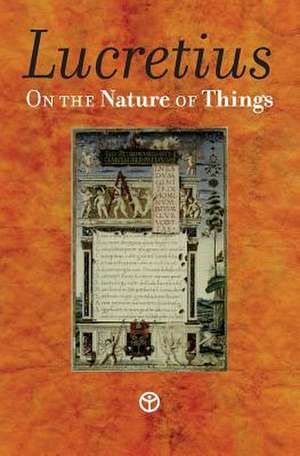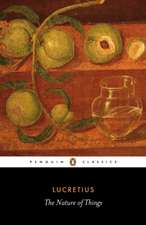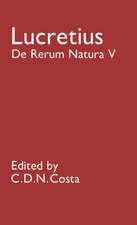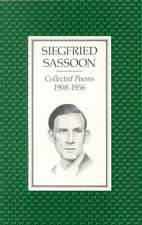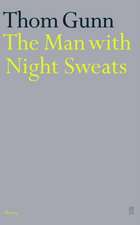On the Nature of Things
Autor Lucretiusen Limba Engleză Paperback
From Epicurus' own hand, only a few fragments and letters managed to survive the Middle Ages. Therefore, it was a major event when the humanist Poggio Bracciolini discovered Lucretius' forgotten poem in a German monastery in 1417. For philosophers and intellectual innovators of the Renaissance, there were suddenly an original and sophisticated system as an alternative to the natural philosophy of Plato and Aristotle taught in scholastic Europe. "De rerum natura" was what may be described as a bible for the scientific revolution. The idea of atoms, the infinite universe and the plurality of worlds, and that mechanical cause and effect lies behind every natural phenomenon -- all this was expressed here. Also, Galileo's laws of motion are in their infancy in the poem; centuries before Christ, Epicurus and Lucretius already understood that an object in motion will continue to move forever, unless something intervene, and that a heavy object does not fall faster than a light one.
"De rerum natura" is considered to provide a fairly unadulterated picture of the Epicurean philosophy, since the differences are insignificant when compared to Epicurus' own fragments and letters. It is published here in a classic 1916 translation by the American poet William Ellery Leonard (1876-1944).
| Toate formatele și edițiile | Preț | Express |
|---|---|---|
| Paperback (4) | 83.30 lei 6-8 săpt. | +22.14 lei 6-12 zile |
| Hackett Publishing Company – 31 aug 2001 | 114.44 lei 3-5 săpt. | +22.14 lei 6-12 zile |
| Focus Publishing – 31 ian 2002 | 128.03 lei 3-5 săpt. | +24.94 lei 6-12 zile |
| Digireads.com – 13 sep 2021 | 83.30 lei 6-8 săpt. | |
| NuVision Publications – 27 iun 2007 | 125.41 lei 38-45 zile | |
| Hardback (3) | 143.80 lei 6-8 săpt. | |
| Hackett Publishing Company – 14 mai 2023 | 340.12 lei 3-5 săpt. | |
| FV éditions – 30 iul 2020 | 143.80 lei 6-8 săpt. | |
| NuVision Publications – 15 iul 2009 | 238.71 lei 38-45 zile |
Preț: 91.89 lei
Nou
Puncte Express: 138
Preț estimativ în valută:
17.58€ • 18.80$ • 14.66£
17.58€ • 18.80$ • 14.66£
Carte indisponibilă temporar
Doresc să fiu notificat când acest titlu va fi disponibil:
Se trimite...
Preluare comenzi: 021 569.72.76
Specificații
ISBN-13: 9789187611049
ISBN-10: 918761104X
Pagini: 284
Dimensiuni: 133 x 203 x 16 mm
Greutate: 0.33 kg
Editura: Timaios Press
ISBN-10: 918761104X
Pagini: 284
Dimensiuni: 133 x 203 x 16 mm
Greutate: 0.33 kg
Editura: Timaios Press
Recenzii
"In Smith's translation, the annotations are particularly helpful providing a wealth of supplementary information..." -- Practical Philosophy, Spring 2003.
Martin Ferguson Smith has for many years been one of the leading Lucretian scholars in the world. . . . We should expect from the beginning then that we are in the hands of a wise and learned guide as soon as we open his Lucretius, and this expectation is certainly borne out by the quality of this sensitive and thoughtful edition. . . . The Introduction . . . is excellent. Smith outlines in a highly accessible manner what little is known of Lucretius' life and times, the poem's position and status in the Epic and Didactic tradition, and the philosophy of Epicurus that Lucretius puts forward, but also manages to include some of the most up to date research, including recent scholarship on the Herculaneum papyri. . . . But of course, the translation is the most important part of the work . . . [and] it is streets ahead of the competition. . . . I can recommend this book unreservedly. --Gordon Campbell, Hermathena
The translation is accurate, clear, readable, and vigorous. The introduction is excellent. It provides the basic information to the non-specialist reader without overburdening him or her with excessive details. The background on what is known of Lucretius' life, contemporary events, and Epicureanism is all very helpful. Smith has incorporated the most recent research, including the new discoveries of Epicurean materials from Herculaneum. --Charles Segal, Harvard University
For anyone concerned to understand the Epicurean philosophical tradition from the inside, the republication, in an updated version, of Martin Ferguson Smith's little-known translation of Lucretius is welcome news. Meticulous, judicious and reader-friendly in equal measure, it embodies the fruits of a lifetime's study of Lucretius' poetic masterpiece. --David Sedley, Christ's College, University of Cambridge
Martin Ferguson Smith has for many years been one of the leading Lucretian scholars in the world. . . . We should expect from the beginning then that we are in the hands of a wise and learned guide as soon as we open his Lucretius, and this expectation is certainly borne out by the quality of this sensitive and thoughtful edition. . . . The Introduction . . . is excellent. Smith outlines in a highly accessible manner what little is known of Lucretius' life and times, the poem's position and status in the Epic and Didactic tradition, and the philosophy of Epicurus that Lucretius puts forward, but also manages to include some of the most up to date research, including recent scholarship on the Herculaneum papyri. . . . But of course, the translation is the most important part of the work . . . [and] it is streets ahead of the competition. . . . I can recommend this book unreservedly. --Gordon Campbell, Hermathena
The translation is accurate, clear, readable, and vigorous. The introduction is excellent. It provides the basic information to the non-specialist reader without overburdening him or her with excessive details. The background on what is known of Lucretius' life, contemporary events, and Epicureanism is all very helpful. Smith has incorporated the most recent research, including the new discoveries of Epicurean materials from Herculaneum. --Charles Segal, Harvard University
For anyone concerned to understand the Epicurean philosophical tradition from the inside, the republication, in an updated version, of Martin Ferguson Smith's little-known translation of Lucretius is welcome news. Meticulous, judicious and reader-friendly in equal measure, it embodies the fruits of a lifetime's study of Lucretius' poetic masterpiece. --David Sedley, Christ's College, University of Cambridge
